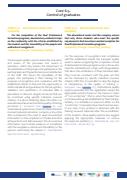Core 6.5. Control of graduates ITEM 6.5.1 Educational center and Company For the completion of the Dual Professional Formative programs, documentary evidence is kept on the conformity with the criteria established by the student and the traceability of the people who authorize or recognize it. Completely / Enough / Something / Nothing The European quality systems advise the evaluation and review of the processes and results in education, which may include the assessment of the satisfaction of the people who participate in the learning tasks and the performance and satisfaction of the staff. This favors the traceability of the people who participate in their training for the purposes of recognition and compliance with the established criteria. To this end, the opportunity to define standards and guidelines for the recognition, validation and certification of individual skills is prescribed. To this end, targets can be set that can be monitored using specific indicators (success criteria). It is about obtaining basic information on educational achievements and the quality of training processes [1. European. See: EQAVET P4, A4]. International systems recommend to the institutions involved (educational center, company or any other that corresponds) the need to keep documented information on the completion of studies and other achievements and skills acquired. The documented information must include evidence of compliance with the acceptance criteria and traceability to the persons authorizing the release [2. International. See: ISO 21001:2018 – Section 8.6)].ITEM 6.5.2 Educational center and Company The educational center and the company ensure that only those students who meet the specific requirements that have been marked complete the Dual Professional Formative programs Completely / Enough / Something / Nothing For the purposes of recognition and compliance with the established criteria, the European quality systems advise recognizing the completion of Dual Professional Formative programs only to those who meet the standards and comply with the guidelines that allow the certification of their individual skills. They must be consistent with the goals set that can be measured by specific indicators (success criteria). With this, it is possible to raise the degree of transparency of the quality of training [1. European. See: EQAVET A1]. International quality systems prescribe that the organization adopt the appropriate actions based on the nature in cases of “non-conformity”, that is, when the student has not achieved the goals established for their training. Similarly, it is advisable to assess its effect on the “conformity” of educational products and services. In any case, if any problem is detected with the training received, detected after the accreditation of the students, these quality systems also suggest applying the appropriate measures to resolve the detected problems [2. International. See: ISO 21001:2018 – Section 8.7.1)].
